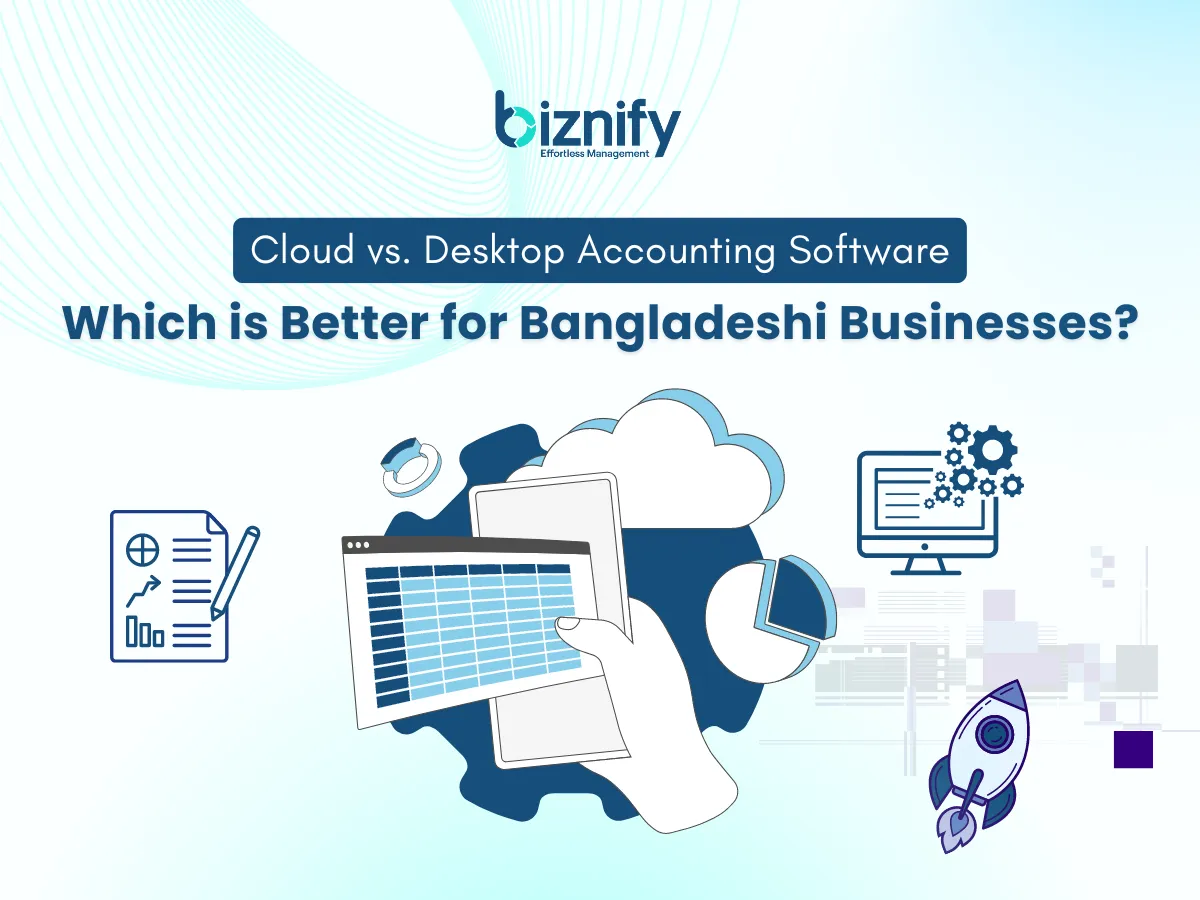
When it comes to managing finances in today’s fast-paced business environment, cloud vs. desktop accounting software is a key decision that Bangladeshi businesses need to make. Both options offer distinct advantages, but the right choice depends on the specific needs of your business.
In Bangladesh, where digital transformation is rapidly gaining momentum, understanding the benefits and drawbacks of each can significantly impact your business’s efficiency, security, and growth potential.
Cloud accounting software offers flexibility, allowing you to access your financial data from anywhere, while desktop accounting software provides the reliability of local data storage with control over updates and security. As businesses in Bangladesh continue to navigate the digital landscape, choosing the right accounting software is more important than ever.
In this guide, we’ll break down the key factors you need to consider when making your accounting software choice, helping you decide which option is the best for your business in 2024 and beyond.
Cloud accounting software is a modern solution that allows businesses to manage their finances online, rather than relying on traditional, on-premise software installed on a specific computer. In Bangladesh, where internet access and digital tools are becoming more prevalent, this type of software offers significant flexibility. Instead of storing data locally, cloud accounting software operates through the Internet, enabling you to access your financial information from any device with an Internet connection.
This software works by securely storing your data in the cloud, meaning on remote servers hosted by a service provider. These providers take care of maintenance, updates, and security, so you don't have to worry about manually upgrading the software or safeguarding your data against potential threats. This system is particularly beneficial for businesses that need to access their accounts on the go, collaborate with remote teams, or simply prefer the convenience of not being tied to a single location.
For Bangladeshi businesses, the benefits of cloud accounting software are particularly appealing. Here are some key advantages:
Cost Savings: Unlike traditional software that requires a significant upfront investment, cloud software typically operates on a subscription basis. This spreads out the costs and eliminates the need for expensive IT infrastructure.
Remote Access: With cloud accounting software, you can manage your finances from anywhere in Bangladesh—or even globally—as long as you have an internet connection. This is especially useful for businesses with multiple locations or those that have embraced remote work.
Automatic Updates: Cloud software providers handle all updates and maintenance, ensuring that your system is always up-to-date without any extra effort on your part. This means your business can always benefit from the latest features and security enhancements.
Scalability: As your business grows, cloud accounting software can easily scale with you. Whether you’re expanding your operations or adding more users, the software can adjust to your needs without requiring significant changes or additional investments.
Integration with Other Tools: Cloud software for Bangladeshi SMEs offers seamless integration with other cloud-based tools, such as inventory management systems or customer relationship management (CRM) software. This integration streamlines operations and enhances overall efficiency.
For example, a small retail business in Dhaka that switched to cloud accounting software was able to monitor daily sales and manage expenses remotely, even while traveling. This led to better financial control and quicker decision-making.
These benefits highlight why cloud solutions are becoming increasingly popular among Bangladeshi businesses looking to stay competitive in a digital world.
Desktop accounting software is a traditional solution where the software is installed directly on your computer or server. Unlike cloud-based systems, all your financial data is stored locally on your device, giving you full control over your accounting processes.
In Bangladesh, this type of software is often preferred by businesses that prioritize data security and want to operate without relying on an internet connection. With desktop accounting software, you don’t need to worry about data being accessible online, which can be an advantage for companies handling sensitive financial information.
However, since this software is installed on specific devices, it requires regular manual updates and maintenance, which can add to the operational overhead. Businesses using desktop accounting software must also manage their own data backups and ensure that their systems are secure against potential threats.
For Bangladeshi businesses considering desktop accounting software, here are some of the key benefits:
Data Security: One of the biggest advantages of desktop software is the ability to store all your financial data locally. This reduces the risk of data breaches and gives businesses greater control over who can access their information.
Offline Access: Since the software is installed directly on your device, you can access your financial data even without an internet connection. This is particularly useful for businesses in areas of Bangladesh where internet connectivity may be unreliable.
One-Time Purchase Cost: Unlike cloud software, which typically requires a monthly or annual subscription, desktop accounting software is often a one-time purchase. This can be more cost-effective in the long run for businesses that prefer not to have recurring fees.
Customization: Desktop software can often be customized to a greater extent than cloud solutions, allowing businesses to tailor the system to their specific needs without depending on the limitations set by a service provider.
Long-Term Control: With desktop accounting software, businesses have full control over when and how they update their systems. This can be beneficial for companies that want to maintain stability and avoid disruptions that might occur during automatic updates.
For instance, a manufacturing business in Chittagong chose desktop accounting software because it needed to ensure data security and had reliable IT staff to manage the system. The business appreciated the ability to operate independently of internet access and the long-term cost savings.
These benefits show why desktop accounting software remains a strong option for many Bangladeshi businesses, particularly those that prioritize control and security over the convenience of cloud solutions.
When choosing between cloud vs. desktop accounting software, it's essential to understand how they compare in key areas that affect your business. Below is a detailed comparison covering cost, security, accessibility, maintenance, and integration.
Cloud accounting software typically operates on a subscription model, which means you pay a monthly or annual fee. This can be more manageable for businesses as it spreads out the cost over time. However, these costs can add up in the long term.
Desktop accounting software usually requires a higher initial investment since you need to purchase the software outright. Once bought, there are no recurring subscription fees, making it potentially more cost-effective over time. However, you may need to budget for occasional upgrades.
Cloud accounting software provides robust data protection through encryption and regular updates by the service provider. While data is stored online, it is generally secure, although it may be more susceptible to internet-based threats if not properly managed.
Desktop accounting software stores data locally, reducing the risk of online breaches. However, the responsibility for data security falls on your business, meaning you’ll need to invest in antivirus software, firewalls, and secure backups.
Cloud accounting software offers unmatched accessibility. You can access your financial data from anywhere with an internet connection, making it ideal for remote work and multi-device support. This flexibility is a significant advantage for modern businesses.
Desktop accounting software limits access to the device where it's installed. This can be restrictive if you need to work remotely or use multiple devices. Accessibility is often confined to the office environment, which might not suit all businesses.
Maintenance for cloud accounting software is handled by the service provider, with updates rolled out automatically. This means your software is always up-to-date without any effort on your part, ensuring smooth operation and access to the latest features.
You are responsible for maintaining the desktop accounting software. Updates must be installed manually, and this can sometimes disrupt work. Additionally, you might need IT support for significant updates or troubleshooting.
Cloud accounting software is designed to integrate easily with other cloud-based tools like CRM, ERP, and project management software. This seamless integration can enhance your overall business operations and streamline processes.
Desktop accounting software may offer fewer integration options, particularly with cloud-based tools. While some software might integrate with other desktop applications, it often requires more effort and might not be as seamless as cloud solutions.
This comparison highlights the key differences between cloud vs. desktop accounting software. By understanding these factors, Bangladeshi businesses can make an informed decision that aligns with their specific needs and operational goals.
Choosing between cloud-based and desktop accounting software is a crucial decision that can significantly impact your business's efficiency, scalability, and cost structure. Both options have their own set of advantages and disadvantages, making it essential to weigh them carefully based on your specific needs.
Scalability:
Cloud accounting software is highly scalable, allowing your business to easily add new users, expand storage, or access additional features as your business grows. This flexibility ensures that the software can evolve with your company without needing significant investments in new infrastructure.
Lower Upfront Costs:
Unlike desktop software, which often requires a significant upfront investment, cloud accounting solutions typically operate on a subscription basis. This reduces the initial financial burden and allows businesses to manage their expenses more predictably over time.
Automatic Updates:
With cloud-based solutions, you benefit from automatic updates that ensure you always have access to the latest features and security patches. This eliminates the need for manual updates, saves time, and reduces the risk of running outdated software.
Accessibility and Mobility:
Cloud software can be accessed from anywhere with an internet connection, making it ideal for businesses with remote teams or multiple locations. This flexibility enhances collaboration and allows for real-time access to financial data, crucial for timely decision-making.
Disaster Recovery:
Since data is stored in the cloud, it is protected from local hardware failures or disasters. This ensures that your financial data remains secure and accessible even in unforeseen circumstances.
Dependence on Internet Connectivity:
Cloud accounting software requires a stable internet connection to function properly. In areas with unreliable connectivity, this dependence can lead to interruptions in accessing financial data, which could impact business operations.
Ongoing Subscription Fees:
While cloud software reduces upfront costs, it requires ongoing subscription payments. Over time, these recurring costs can add up, potentially making cloud solutions more expensive than desktop alternatives, especially for long-term use.
Data Security Concerns:
Although cloud providers implement robust security measures, some businesses may still be concerned about storing sensitive financial data off-site. This concern is particularly relevant for businesses handling highly confidential information or those subject to strict data protection regulations.
Limited Customization:
Cloud-based solutions may offer less flexibility for customization compared to desktop software. Businesses with unique needs might find cloud options less adaptable to their specific operational requirements.
Control Over Data:
Desktop accounting software provides complete control over your data, as it is stored locally on your business's hardware. This control can be crucial for businesses with strict data privacy requirements or those that prefer not to store sensitive information on external servers.
One-Time Purchase Cost:
Desktop software usually involves a one-time purchase fee, which can be more cost-effective over the long term compared to the recurring subscription fees of cloud solutions. This is particularly beneficial for businesses that prefer to minimize ongoing expenses.
Offline Access:
One of the significant advantages of desktop software is the ability to operate without an internet connection. This ensures that you can access your financial data and perform accounting tasks even in areas with limited or no internet connectivity.
Greater Customization:
Desktop solutions often offer more robust customization options, allowing businesses to tailor the software to their specific needs. This can be particularly beneficial for companies with complex or unique accounting requirements.
Higher Maintenance Requirements:
Desktop accounting software requires regular manual updates and maintenance, which can be time-consuming and may require technical expertise. Additionally, businesses are responsible for data backups and ensuring the security of their financial information.
Lack of Mobility:
Since desktop software is installed on specific devices, it lacks the mobility offered by cloud solutions. Accessing data outside the office or from multiple locations can be challenging, limiting flexibility in managing finances remotely.
Potential Higher Long-Term Costs:
While the initial purchase cost may be lower, desktop solutions can incur additional expenses over time for upgrades, support, and hardware maintenance. These costs can add up, potentially making desktop software more expensive in the long run.
Limited Collaboration:
Desktop software generally lacks the collaborative features of cloud-based solutions. For businesses that require real-time collaboration between team members in different locations, this can be a significant limitation.
When choosing the best accounting software for your business in Bangladesh, Biznify offers a strong contender, particularly for businesses seeking robust features tailored to local needs.
Biznify (available at biznify.net) is designed to streamline financial management for businesses of various sizes. Here’s why Biznify might be the right choice for your business:
Comprehensive Accounting Modules: Biznify provides extensive tools for handling all aspects of accounting, including invoicing, payroll, and financial reporting.
User-Friendly Interface: The software is designed to be intuitive, making it accessible for users with varying levels of accounting knowledge.
Scalability: Whether you're a small startup or a growing enterprise, Biznify offers scalable solutions that can evolve with your business needs.
Local Compliance: The software is tailored to meet Bangladeshi tax regulations and compliance requirements, ensuring your business stays in line with local laws.
Customization: Biznify allows for significant customization, enabling businesses to tailor the software to their specific operational needs.
Support for Multi-Entity Management: For businesses with multiple branches or departments, Biznify offers multi-entity management capabilities, providing a consolidated view of finances.
Real-Time Monitoring: With real-time financial monitoring, businesses can make informed decisions quickly and efficiently.
Small to Medium-Sized Businesses: Biznify is well-suited for small and medium enterprises that need a comprehensive accounting solution without the complexity of larger, more expensive software.
Businesses Focused on Local Compliance: Companies that prioritize compliance with Bangladeshi tax and financial regulations will benefit from Biznify’s localized features.
The choice between cloud vs. desktop accounting software in Bangladesh depends on your business's specific needs. Cloud-based solutions are ideal for businesses that prioritize accessibility, scalability, and lower upfront costs, while desktop software is a better fit for those who value data security, one-time purchase costs, and offline access.
Biznify stands out as a strong contender, offering comprehensive features, user-friendliness, scalability, local compliance, and customization options. Carefully consider these factors and explore options like Biznify to make an informed decision that aligns with your business's goals and sets it on the path to financial success.
Cloud accounting software is accessed through the internet, allowing you to manage your finances from anywhere. Desktop accounting software is installed on your computer, providing more control over data storage but requiring local maintenance.
Yes, cloud accounting software is generally secure. Reputable providers use encryption and other security measures to protect your data. However, it's essential to choose a provider with a strong security track record.
Consider factors such as your business size, budget, required features, and the level of technical expertise you have. Also, look for software that complies with Bangladeshi tax regulations.
Switching from desktop to cloud accounting software can be done, but it may require some effort to migrate your data and adapt to the new system. Consider seeking professional assistance if needed.
Get a guided product demo tailored to your business needs. No assumptions. No generic walkthroughs. Just real use cases.
.webp)
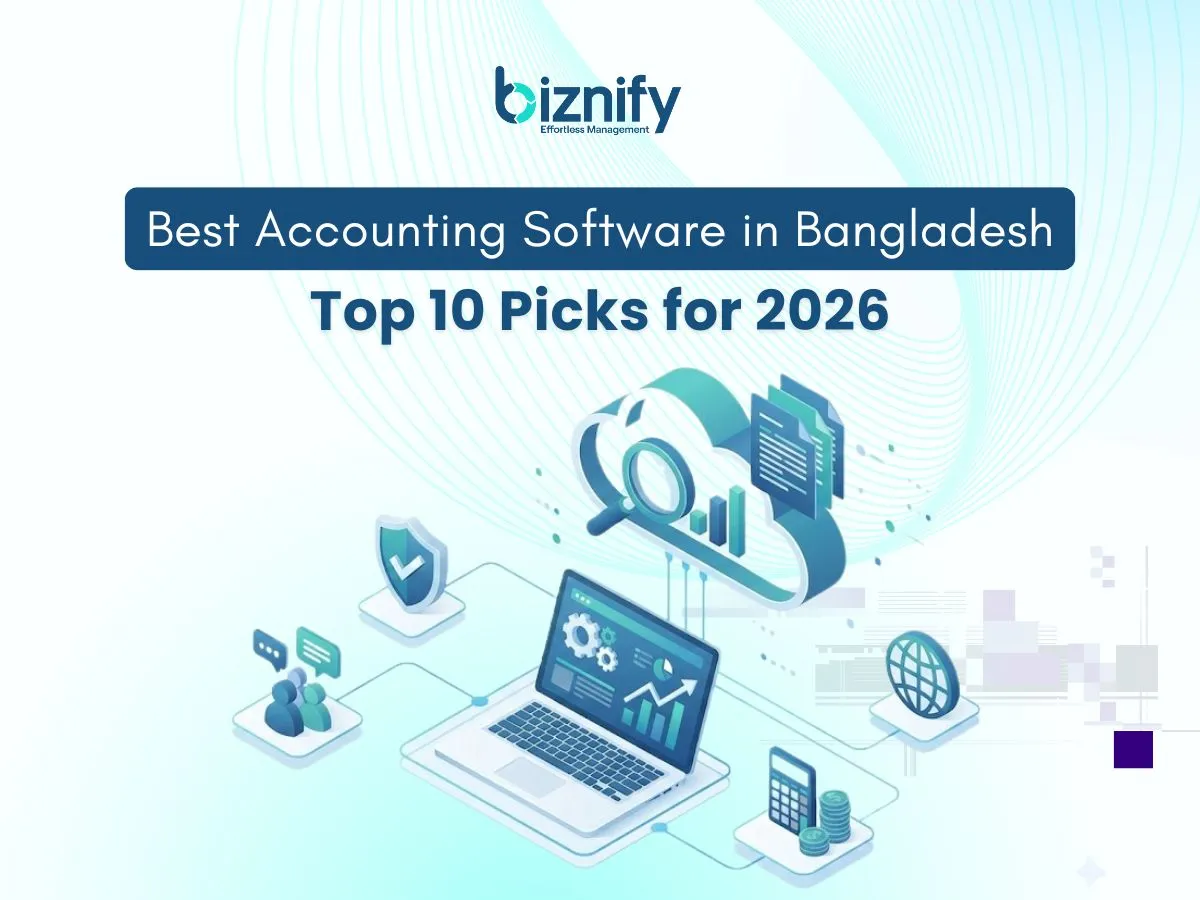
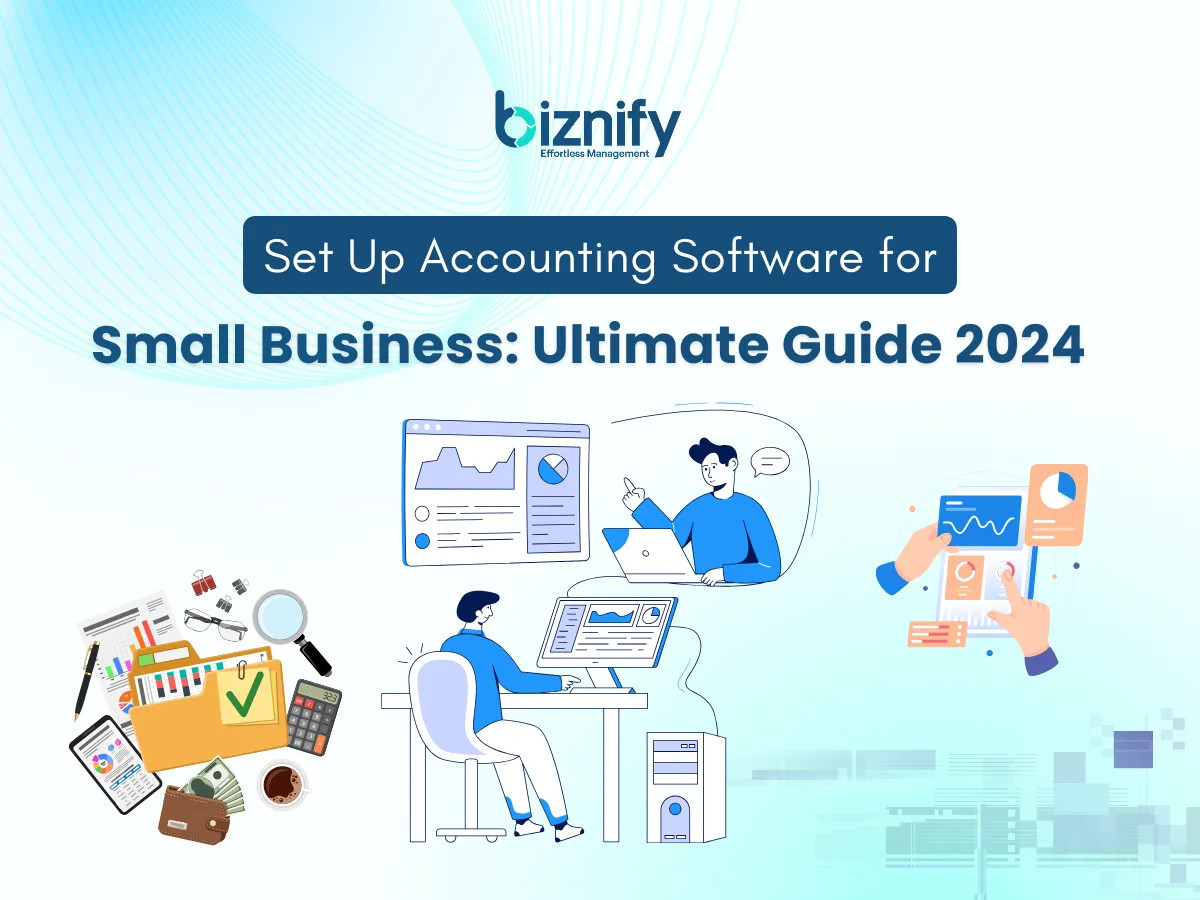
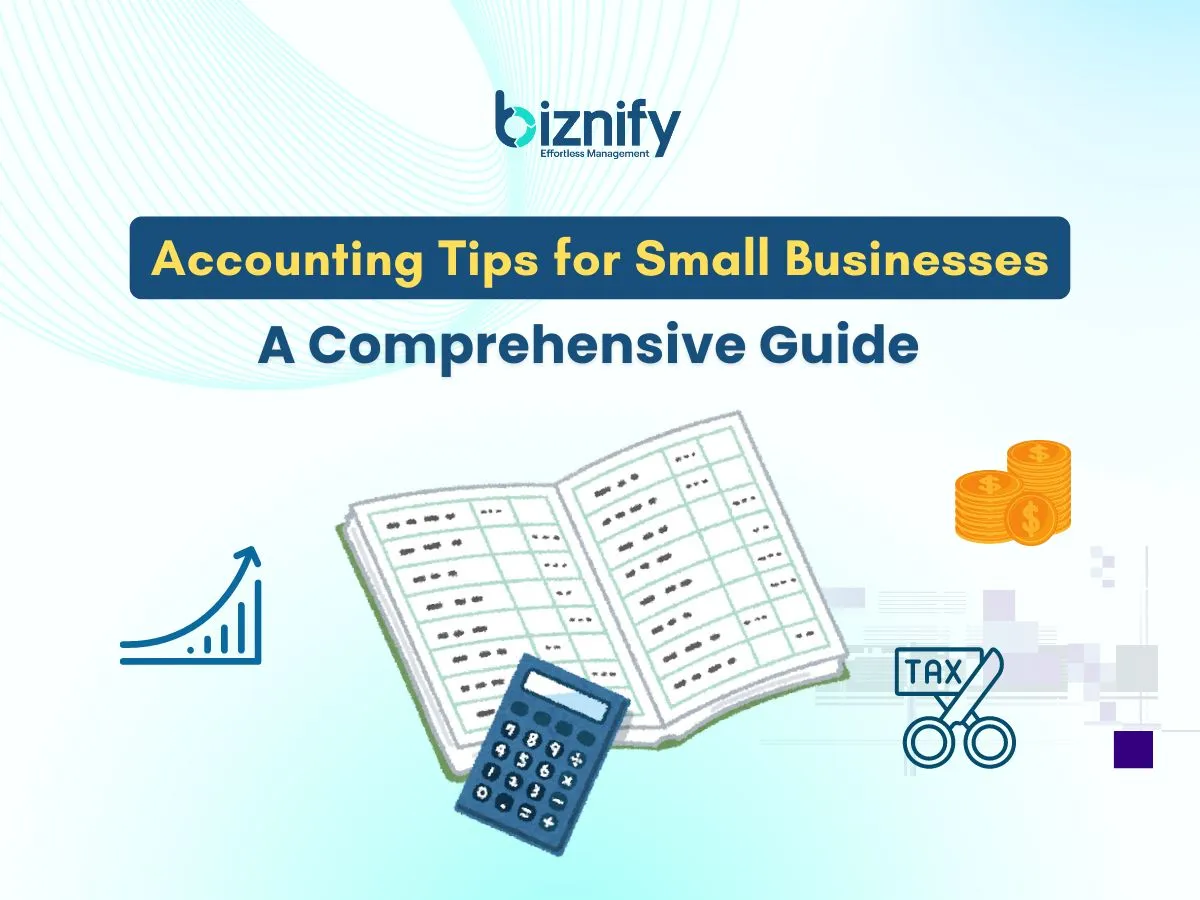
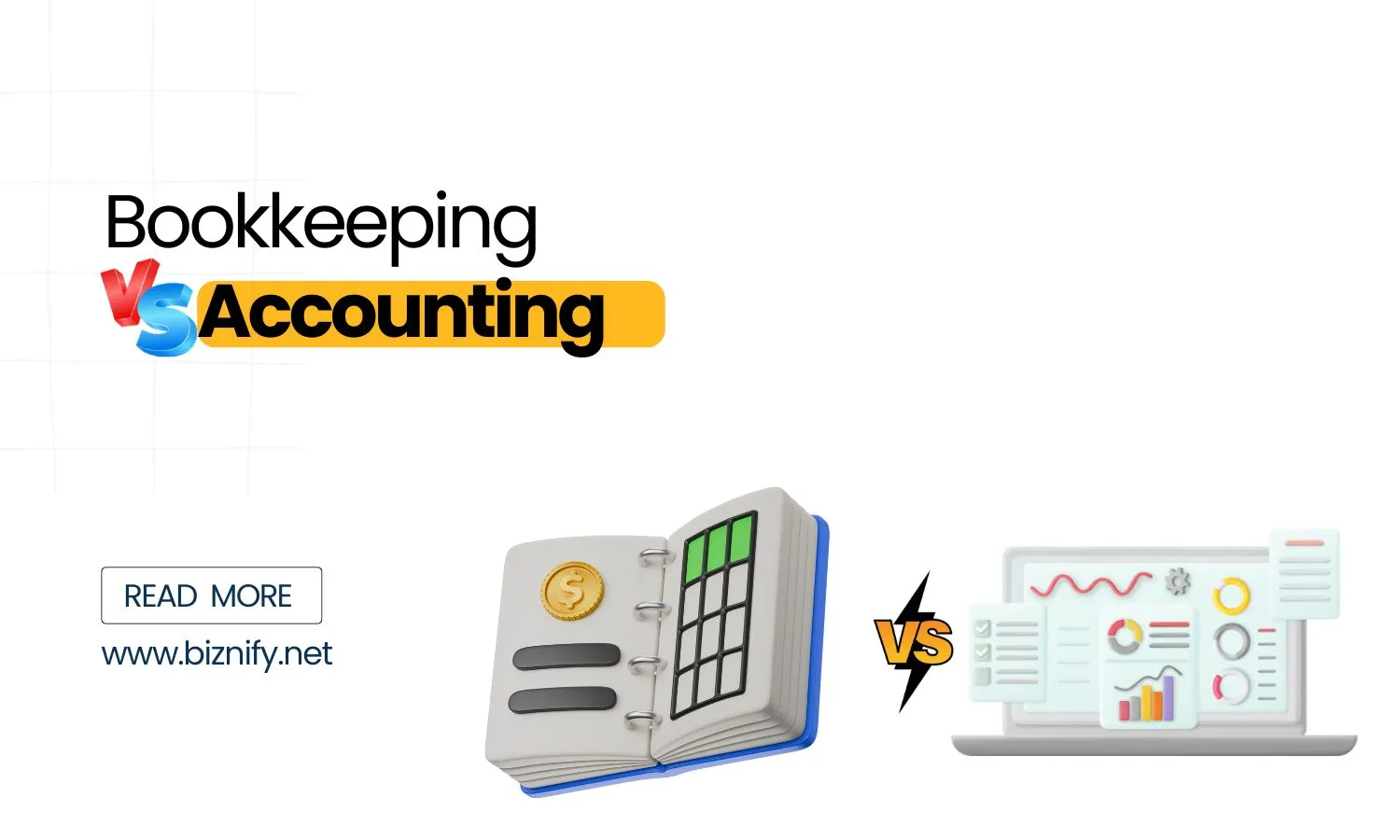
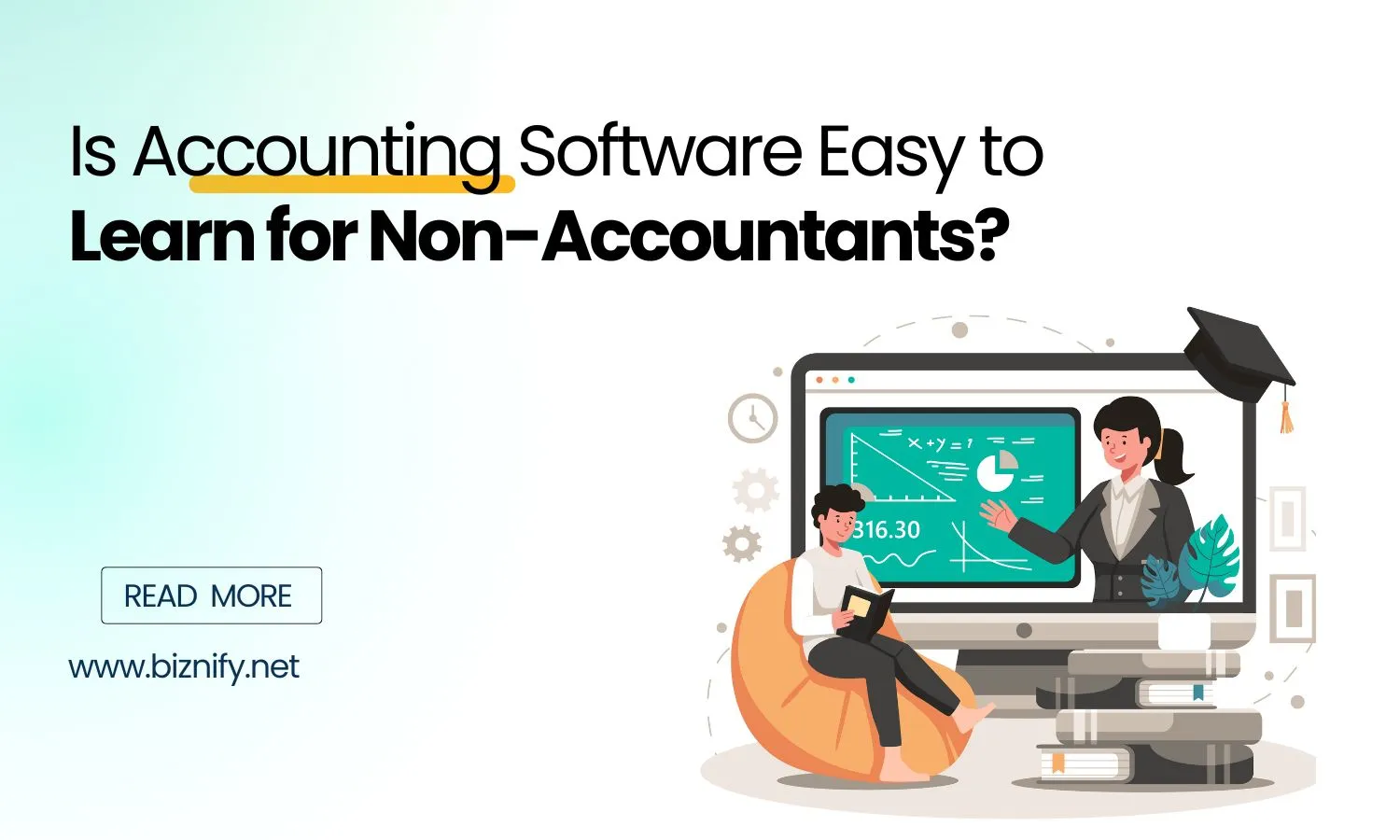
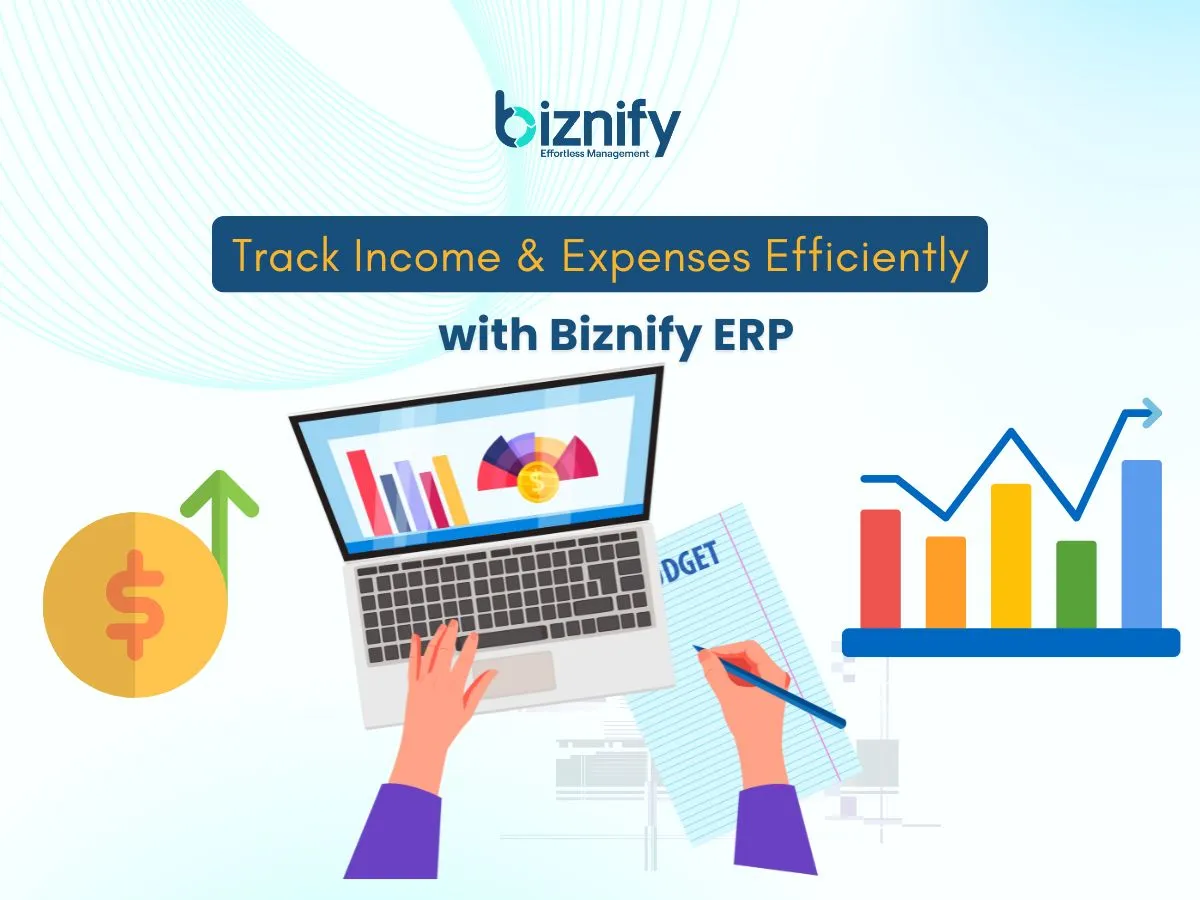
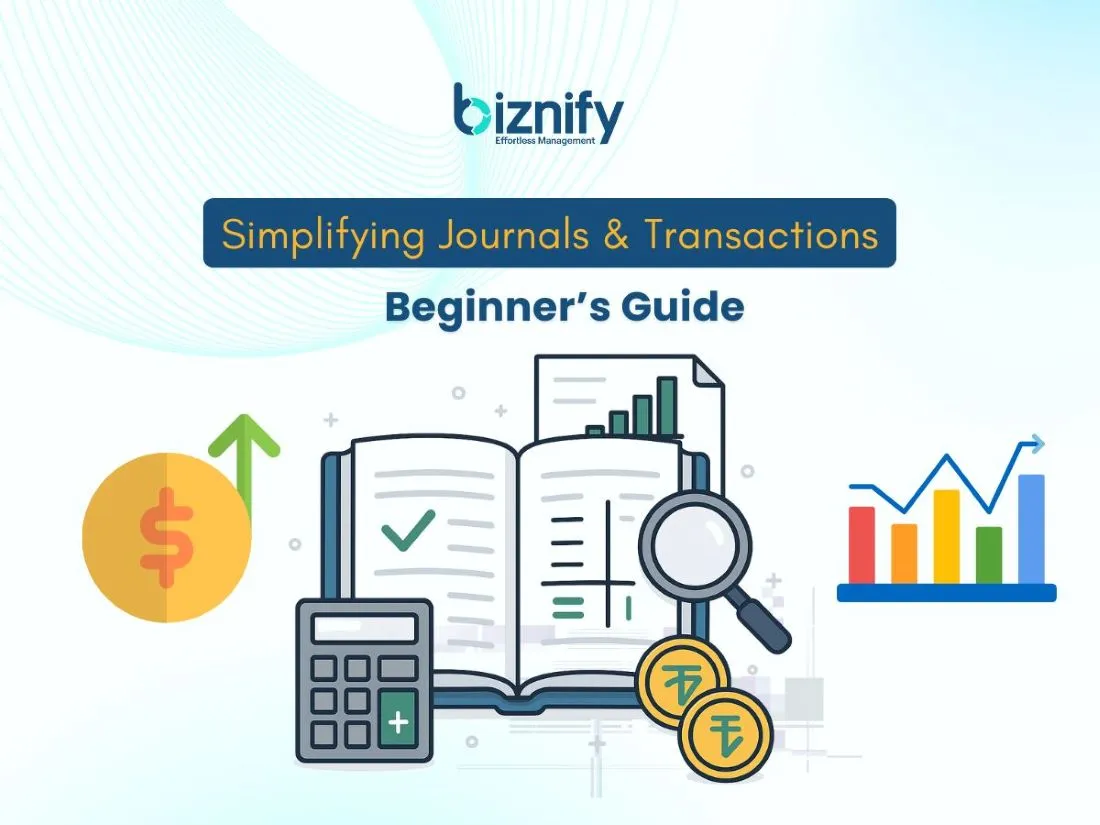
Just exploring ERP or unsure which modules you need? The Biznify team’s here with straight answers.